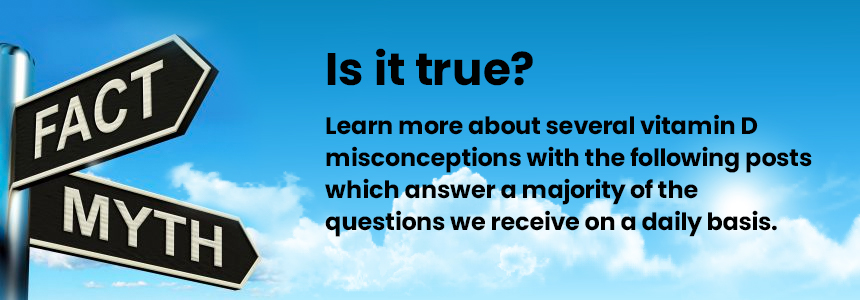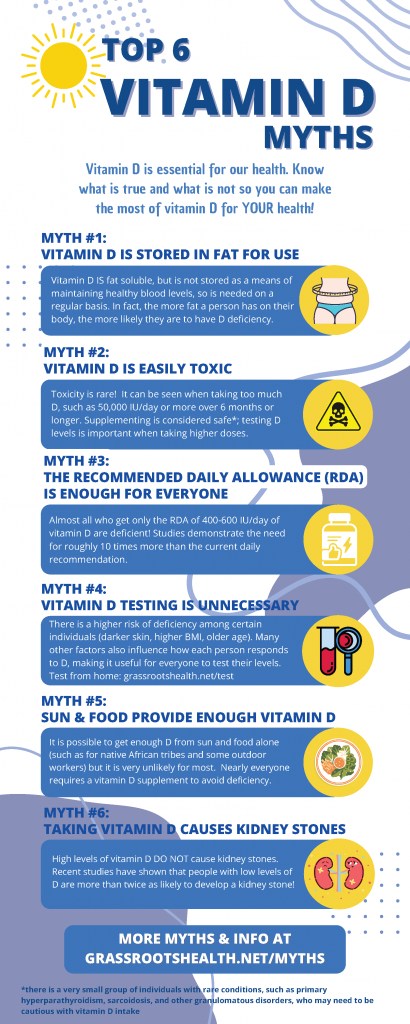
Myth #1: Vitamin D is Stored in Fat for Use
“You don’t need to supplement with vitamin D because it is stored in your fat cells for use.”
Is this true? The fat storage for use debate…
Read More

Myth #2: Vitamin D is Toxic
“Watch Out! Vitamin D can build-up in your fat and become toxic.”
Is this true? The toxic fat stores debate…
Read More
“Careful not to take too much, vitamin D can be easily toxic.”
Is this true? How much is too much?…
Read More

Myth #3: Taking Vitamin D Makes Other Nutrients Deficient
“Supplementing with vitamin D can cause deficiencies in other nutrients”
Is this true? Can taking vitamin D create a co-nutrient imbalance?…
Read More
Myth #4: Current Recommendations are Enough
“The current recommendations for vitamin D intake from the National Academy of Medicine (previously the IOM) are good enough (400-600 IU per day), any more can be harmful”
Other sayings for this one include “My doctor told me all I need is 600 IU/day, and that it is dangerous to take more,” or “There is no benefit to taking more vitamin D or having a level above 20 ng/ml, because that is what the medical recommendation is.”
Is this true? The debate over current medical recommendations for vitamin D…
Read More

Myth #5: Vitamin D Testing is Unnecessary
“Vitamin D testing is not necessary. The only people who should be testing their vitamin D levels are those who are considered ‘high-risk’ for deficiency”
Is this true? IS vitamin D testing necessary…?
Read More


Share the top myths with this infographic!
Download and share now.
Myth #6: Sun and Food Provide Enough Vitamin D
“Most people can get enough vitamin D from sun exposure and diet alone”
Or, “You probably get enough vitamin D with about 15 minutes of sun to the face, arms, and hands at least twice a week without sunscreen”… yes, we’ve heard this before!
Is this true? Can sun and food alone provide enough vitamin D? Plus, a few other myths about vitamin D from sun and food…
Read More

Myth #7: Kidney Stones
“Taking vitamin D causes kidney stones”
Is this true? The facts behind vitamin D and kidney stones…
Read More

Myth #8: Vitamin D Supplementation Never has Side-Effects
“Vitamin D supplementation has the same safety for everyone”
Is this true? Unfortunately, no. While it is true that the majority of individuals have no issues when taking vitamin D (in fact, many notice improvements in how they feel), there is a very small percentage of people who do experience unwanted side-effects. There are several rare but very real situations in which individuals with certain conditions may experience what seems to be a hypersensitivity to vitamin D supplementation, and sometimes, to the sun as well.
People with Primary Hyperparathyroidism (PHPT) or Sarcoidosis, and other Granulomatous Disorders should take extra caution with vitamin D. If you know or suspect that you have any of these conditions, or if you experience what feels like a hypersensitivity or negative effects due to vitamin D, please work with your health care provider to address these conditions, and work with them to safely resolve any existing vitamin D deficiency.
Read More
Myth #9: The Same Amount of Vitamin D is Good for Everyone
“Everyone needs the same amount of vitamin D”
Is this true? Most definitely not… everyone responds differently to sun and supplements, AND, each person may have unique health needs that may require higher vitamin D levels to target, such as for cancer.
Read More
Myth #10: The Hormonal Vitamin D is the Only Form that Benefits Us
“The only active form of vitamin D and the only one important to our health is the hormonal form”
Is this true? Certainly not! The common misconceptions concerning the 3 main forms of vitamin D found in our body…
Read More
Do you have any other questions about vitamin D that you would like answered? Let us know by emailing jen @grassrootshealth.org!
Measure Your Level of Vitamin D Today!
 Having and maintaining healthy vitamin D levels and other nutrient levels can help improve your health now and for your future. Choose which to measure, such as your vitamin D, omega-3s, and essential minerals including magnesium and zinc, by creating your custom home test kit today. Take steps to improve the status of each of these measurements to benefit your overall health. You can also track your own intakes, symptoms and results to see what works best for YOU.
Having and maintaining healthy vitamin D levels and other nutrient levels can help improve your health now and for your future. Choose which to measure, such as your vitamin D, omega-3s, and essential minerals including magnesium and zinc, by creating your custom home test kit today. Take steps to improve the status of each of these measurements to benefit your overall health. You can also track your own intakes, symptoms and results to see what works best for YOU.
Enroll and test your levels today, learn what steps to take to improve your status of vitamin D (see below) and other nutrients and blood markers, and take action! By enrolling in the GrassrootsHealth projects, you are not only contributing valuable information to everyone, you are also gaining knowledge about how you could improve your own health through measuring and tracking your nutrient status, and educating yourself on how to improve it.
